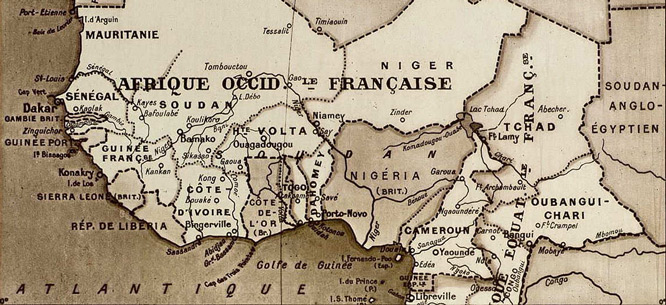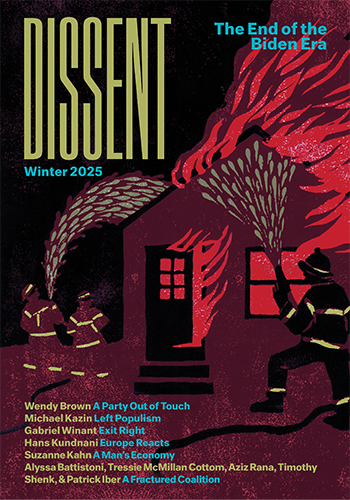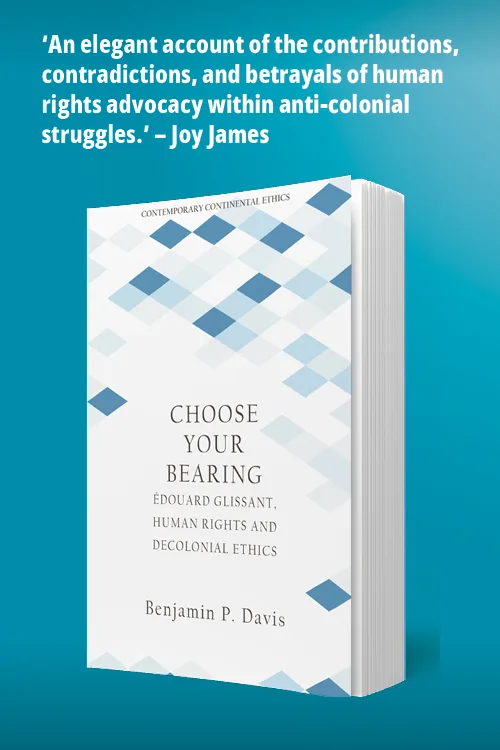Fantasies of Federalism
Fantasies of Federalism
Why did the nation-state model win out, when the alternatives were supposedly so compelling?

Citizenship between Empire and Nation: Remaking France and French Africa,
1945–1960
by Frederick Cooper
Princeton University Press, 2014, 512 pp.
Freedom Time: Negritude, Decolonization, and the Future of the World
by Gary Wilder
Duke University Press, 2015, 432 pp.
In several essays written in the midst of the Second World War, Hannah Arendt advocated federalism as a replacement for nationalism, which she believed had been rendered obsolete. Adolf Hitler had demonstrated the limits of ethnic homogeneity as a basis for political organization. The idea of “the nation” that had set the world on fire had definitively revealed its shortcomings: it failed to hold up when mapped onto territory shared by different peoples and so often ruled by a permanent majority. “Nowhere in Europe today,” Arendt remarked in 1945, “do we find a nationally homogeneous population.” Furthermore, political federalism of some sort had worked for Americans for a century and a half. Why not Europe? Why let nation-states remain the rule? A federation could grant rights to nationalities dispersed amidst and athwart one other.
Arendt’s federalism—recently recovered by historians Gil Rubin and William Selinger—also applied to the Middle East. It would make Jews and Palestinians equal members of some larger political entity, in which each group would have a measure of self-government in their own affairs and a role in collective decision-making. A land of two peoples within the same state, Arendt wrote in wartime, would in the long run merely reverse the Zionist result of Jewish dominance over Palestinians in the area, substituting one hierarchy for another. By contrast, a larger federation would put the two nationalities on par for good, locking in a measure of autonomy and parity of voice. Perhaps the federation would take shape through a decolonized but worldwide British empire, Arendt and others mused. Or, perhaps, at the already vast scale of the Mediterranean region alone. The point was that, there and elsewhere, humanity could transcend the divisive quest for nation-states for good.
Such creative thinking did not bear fruit. The brief enthusiasm for federalism was born out of a loss of faith with interwar democracy, which had been founded in Eastern Europe on the basis of majority rule. But this principle made Jews and others perpetual losers, even though the international regime of the League of Nations was supposed to offer minorities some recourse. Any new configuration would have to respect human beings in their various groupings and go beyond the old solution of protecting minorities from majorities through constitutional mechanisms or international law. But soon enough, it was clear that East European Jewry was dead, and with their destruction, Jewish geography and geopolitics also shifted.
Yet it was not just in Europe and the Middle East that the nation-state—so often viewed in wartime as outmoded or even blamed for the entire conflict—triumphed after the war. As Arendt observed in 1946, in Eastern Europe “the restoration of national states, which insist more than ever before on national homogeneity” was the universal norm—a process only abetted by the disappearance of the Jewish people. To complete this picture, Germans who remained in Eastern Europe were brutally forced west. And the nation-state, once declared a relic, emerged from the ashes of the Second World War as a galvanizing and ultimately victorious aspiration far beyond Europe. Rather than reforming to retain pluralistic unity, the British empire gave way to bloody partition in South Asia very quickly.
A powerful wave of historians insist, however, that federalism was no flash in the pan. They contend that the nation-state was not inevitable, especially when it was time for France to decolonize in Africa. These historians have presented tremendous evidence of what some call a “federal moment”—one which, thanks to the distended process of decolonization, lasted surprisingly long into postwar history. Frederick Cooper is the leader of the group, but several other historians like Todd Shepard and Gary Wilder have buttressed his findings. The implications of their way of thinking are profound. After millennia of imperial arrangements that incorporated different peoples into the same polity, Cooper and others say, there is no reason to regard the nation-state of our time as much more than a historical accident and political mistake—one that perhaps ought to be undone.
In an era of revulsion towards nation-states, and especially nation-states in postcolonial circumstances, we can appreciate why the story of federalism might be worth recalling. Is there anything else besides the nation that otherwise implacable enemies—liberals, Marxists, and postcolonialists—can more easily agree about, if only to agree in what they hate? The nation-state has always been exclusionary and has often been violent, offending the cosmopolitanism of liberals and the desire of Marxists for solidarity beyond borders. The nation-state has also been a severe disappointment to postcolonialists, who believe that new nations succeeded mainly in creating new elites and perpetuating the suffering of their populations at large.
However, for the history of federalism to be more than trivia, it has to be shown that it was actually possibile and that it might have yielded better results than the nation-state. Neo-federalist historians rarely take it upon themselves to solve what ought to be the central puzzle: why did the nation-state model win out, when the alternatives were supposedly so compelling?
In 1945, the defeat of the Nazis provided a window of opportunity for the colonized world. This was especially true for the French empire, since its metropole had fallen and a new republic had to be crafted from scratch. And debts were owed to colonial subjects who had served in the war: a black colonial official from Guyana, Félix Éboué, had kept French Equatorial Africa out of the clutches of the Vichy revolution at home, and he was praised for saving the honor of the empire.
Charles de Gaulle attempted to ratify the continuation of the French empire at the Brazzaville conference in 1944, where he flew to meet with his Free French compatriot Éboué. But events and new pressures for a fair deal periodically shook arrangements. Among others, Senegalese politicians Mamadou Dia and Léopold Sédar Senghor exploited these opportunities, first in 1946 when the Constitution established the Fourth Republic, and then again in 1958, when the Algerian war prompted the creation of the Fifth Republic, with its own new constitution.
As the constituent assembly for the 1946 charter loomed, it was revolutionary for colonial subjects to enjoy political representation. Men like Senegal’s Lamine Guèye and Côte d’Ivoire’s Félix Houphouët-Boigny—after whom laws abolishing colonial subjecthood in favor of republican citizenship and criminalizing the common colonial practice of forced labor were later named—could now express their interests. Although they were no longer imperial subjects, however, Africans were still second-class citizens. Almost no Africans could vote on the constitution, which called for detailed laws establishing different rights and responsibilities depending on where one stood in the federation or “French Union,” which had replaced the empire. When that constitution was voted down, it became a matter of preserving the basic formulation of formal citizenship without real equality in the next constitution, which was finally ratified in late 1946.
For ten years, and then after the passing of the fateful “framework law” of 1956, which in retrospect created the basis (including territorial lines) on which decolonization took place, Senghor and others maneuvered for a fairer and more egalitarian federation. Later, with the advent of the Fifth Republic in 1958, the French Union became the “French Community.” Dia and Senghor understood that the result of nationalism would be to sever the old colonies from the wealthy metropole and to leave them free and sovereign but poor and isolated. So they entertained various schemes and experimented with different visions of federalism that would preserve the relationship of the old imperial territories with metropolitan France as well as with a more local “confederation” for French West Africa.
And then it all quickly came to an end. By 1958–60, the very maneuvers that had aimed at crafting a fairer hierarchy between France and its “community” ended up undoing the federalist structure. Summoned to the presidency to save the republic from the Algerian war, Charles de Gaulle ultimately decided to let Algeria go in 1962. De Gaulle was initially desperate to maintain sub-Saharan Africa as a federation for the sake of France’s grandeur. But he was unable to do so on terms that Africans—now empowered by the federation—found acceptable. Africans were allowed to vote on the 1958 constitution, but two years later, they declared sovereign independence. (Sadly, Senghor soon became an autocrat and purged Dia, among other former allies.)
Frederick Cooper’s Citizenship between Empire and Nation—which painstakingly reconstructs this narrative—is the culmination of a long historiographical campaign. Initiated years ago with Empires in World History (written with Jane Burbank), its goal is to show how late and contingent the rise of the national form to global dominance really was. Cooper has another new book out, Africa in the World, which presents the argument in its most abbreviated form. But Citizenship between Empire and Nation is where to look for the details, and it is nothing short of a masterpiece.
Cooper unquestionably demonstrates that Dia and Senghor didn’t want to leave a French empire now claiming to transcend its old form and presenting itself as an alternative to the creation of new sovereign states. Even the meager rebranding of “empire” as “union” established a fecund basis for new claims, Cooper shows. Africans got little aside from the continuing right to minimal representation in how the union would govern them; but, Cooper stresses, they considered it the basis to “set a process in motion.”
Yet Cooper draws the wrong moral from his profoundly researched story. Always and insistently he argues that the nation-state was not inevitable. He never argues that a federalist alternative was actually possible without also perpetuating hierarchy. In fact, he demonstrates the reverse: that imperial federalism was doomed. He provides evidence for the argument that there was no way that a new type of citizenship could last within some sort of federalist imperial system.
It is this tension between historiographical goal and historical demonstration that makes Cooper’s agitation to remember federalism so confusing. In parallel literature about alternatives to the State of Israel—Jewish “roads not taken” such as diasporic nationalism or various non-nationalist modes of belonging, circulated long before Arendt’s 1940s dreams of a federation there—what is rarely explored is why Zionism won and why, like other forms of galloping nationalism, it seemed so uplifting for so long. A virtue of Cooper’s historical probity is that answers shine through in spite of his argument.
In practice, Dia and Senghor took their marbles and returned home when their demands resulted in the failure of imperial federalism. In 1958, one Machiavellian observer concluded that the only way that Africans could be retained as subjects was to allow them to leave: “to recognize the right to independence is now perhaps the only way to get them to renounce it.” But it seems almost inevitable that that right was going to be exercised. Through the attempt to save empire, Africans like Senghor had been sufficiently empowered, and it seems implausible that they would not exercise that power to end it—which is what they did.
More broadly, hierarchies do not dissolve consensually; they are only reinvented through negotiations. The metropolitan French didn’t want an empire that was politically equal (or financially expensive), while their former colonial subjects didn’t want one that was unequal. Never the twain could meet. Reformist empire had to fall and postcolonial sovereignty—where fellow citizens hoped to win more serious equality on the ruins of imperial hierarchy—had to win. “Turning colonialism into federalism might be thought to be too utopian a vision or too much of a compromise,” Cooper writes. “But the ‘realistic’ alternative has not proven itself to be such a clear route to human progress.” True, but the way one establishes that a supposedly missed opportunity was plausible is not to insist on its ethical superiority, but to demonstrate that it was realistically available. Cooper does not do so.
Though rarely looking outside the French empire, Cooper acknowledges the early nationalist victories of South Asian partition. However, he considers the global enthusiasm for nation-states less relevant in places like Senegal, which were never going to be economically self-sufficient. The strength of Algerian nationalism in the period—the FLN had “national liberation” in its name—is explained (away) in a similar allusion. Cooper also admits that the places that remained under United Nations trusteeship after 1945, like northern Cameroon and western Togo under French supervision, were explicitly supposed to be prepared for sovereign nationhood. Even within the French empire, part of what was distinctive about Senegal—especially in the Quatre Communes area on which Cooper focuses—was that black Africans had special perquisites going back to the seventeenth-century conquest. Unlike the vast majority of other Africans, they were already acknowledged as citizens of the French empire in 1916. They therefore had incentives to buy into imperial experimentation. As for Morocco and Tunisia, former French protectorates, they simply wanted (and got) statehood. The hopes for federalism, even within the terms of Cooper’s story, begin to look rather exceptional.
Cooper rightly focuses on how incipient federalization of France in the ten years after 1945 allowed social gains like better wages and union rights, in addition to the abolition of forced labor. It is worth observing, however, that for all its repudiation by historians, the nation-state has been where the greatest redistributive politics have occurred. Historian Todd Shepard has shown that some of the new perquisites of the French welfare state were first developed for the sake of “affirmative action” for Algerians. In the hope that this would discourage them from participating in breakaway nationalism, Algerians were thrown a bone to secure their loyalty to empire. Yet when the constitution of India was drafted in 1949, it defined the nation as socialist, and listed social and economic justice as the first ideals in her constitution, even before political justice; Israel was also founded by socialists. We now know from Thomas Piketty that the very years Cooper charts marked an interruption to the “normal” acceleration of inequality thanks to more just redistribution. But that occurred in boundaried territory, not far-flung empire.
If we are nostalgic for aspects of the post–Second World War welfare state, we are nostalgic for an exclusionary politics that created the grounds for redistribution by privileging a set of national insiders. If Cooper or Shepard are implying that redistribution would have been available within a reformed empire, with the same entitlements as the British and French welfare states achieved for their citizens, it will be tough to prove, and not only because of the difficulties of counterfactual reasoning. Redistribution depends on making some people insiders, so it is not an accident that it makes other people outsiders. The tragic postwar history Cooper narrates may confirm that deep and costly redistribution was never an option on an imperial scale, and that to the extent that redistribution did briefly occur, it did so in tandem with decolonization and the establishment of nation-states. The actual alternative to it was not federal redistribution but the neoliberal globalization of our day, both where the welfare state was built and in places like Africa where it was not. The redistribution that was achieved within nations, and not the redistribution that failed to occur within empires, should also be viewed as the lost opportunity of our time.
Of course, this argument will not seem plausible to historians of Africa who do not want to hear that nationalism succeeded globally to the benefit of redistributive politics in the old metropoles alone. Certainly they are right to suppose that imperial redistribution was a more realistic possibility than calls for “global justice” that today’s cosmopolitans urge. That ignores, however, that it was precisely the new states of the global South that, despite their continuing poverty and failure to create their own national welfare states, formulated a critique of “neocolonialism” and proposed a “New International Economic Order,” in the 1960s and 1970s, after Cooper’s story ends.
Yet the current historiography of federalism, which is primarily concerned with formal sovereignty and its alternatives, does not really engage with debates about the global economic order. From our current perspective, however, it seems less important that empires dissolved formally through the multiplication of nation-states than that they were reinvented informally by powerful economic forces that mocked the sovereignty of nation-states. In another new book on French West Africa, From Empires to NGOs in the West African Sahel: The Road to Nongovernmentality, Columbia historian Gregory Mann focuses much more on this newer set of realities, and it is easy to see why.
Ten years ago, in a response to Niall Ferguson’s claims after the American invasion of Iraq that the imperial burden needed to be shouldered again by Great Britain’s successor, Cooper wrote that the lesson of history is that the richest and best-intentioned empires, when they finally got around to reforming themselves after the Second World War, ultimately cut and run. If this is true, then the example of reforming empires matters today because they were never up to the challenge of dissolving hierarchy. “We are not stuck with a choice between a politics of nation-states . . . and an amorphous globality,” Cooper concluded in response to Ferguson, “or between inviolable sovereignties and unrestrained interventions.” But what follows from Cooper’s history of experimental federalism after the Second World War is a cautionary tale of failure to split the difference, and the absence of any institutional form that succeeds in doing so even today.
Gary Wilder’s soaring new book, Freedom Time, is different from Cooper’s in almost every way, except for its kindred desire for an alternative to the nation-state. Where Cooper assesses the documentary trail of those alternatives, Wilder calls attention to their utopian and unrealistic content. Instead of considering Senghor a statesman, he dwells on him and the Antillean anticolonialist Aimé Césaire as political theorists.
A superficial treatment of historical facts compared to Cooper’s thick study, Wilder is more interested in Senghor as a thinker and poet. Most importantly, he forthrightly repudiates any notion “that the French Union marked the end of colonial rule,” or even “that Africans could have found a way to accommodate themselves to a reformed colonialism.” That “decolonization may not have been necessary” is hardly what he wants to establish. Imperial federalism masked continuing domination and could never escape its founding contradictions; and if this is the case, there must be a different reason to study it. Wilder is motivated to return to this past not only to understand outcomes but also to retrieve forgotten utopianism.
In The Wretched of the Earth, Frantz Fanon dismissed Senghor as a “pharisee” for counseling imperial federalism rather than an independent nation and claimed that Senghor identified with the colonial aggressor in doing so. It is not that Fanon rejected supranational politics. But for him, “national consciousness is alone capable of giving us an international dimension,” for if nationalism “expresses the will of the people . . . it will necessarily lead to the discovery and advancement of universal values.” Wilder pushes back, presumably in part out of postcolonial depression about where Fanon’s nationalism led Africa—even though Wilder is much more willing than Cooper to blame the results on the hidden legacies of empire itself.
But how can Wilder be so certain that national forms of identification and even institutions could play no role in Senghor’s utopian vision of the future? Could the modern trinity of people, territory, and sovereignty soon disappear? Perhaps the reason that Wilder, like Cooper, understands the nation-state as the main enemy is that he, like so many others, is despondent not only about the postcolonial present, but also about the current state of America and the global North. But that is no cause to underestimate—just as many anticolonialists overstated—the possibilities of nationalism, with all its flaws, for progressive politics. While it may seem foolhardy to propose to rescue the nation-state from the enormous condescension of posterity, it is critical all the same to understand why so many of our ancestors chose it.
If no one ever wrote the epitaph for the federalism that Cooper sees as so pervasive and Wilder as so promising, it was because the victory of nationalism was so rapid, so thorough, and so exciting. No doubt nationalism has left us, half a century on, with a bad world still divided into rich and poor, with the states of the world jealously guarding their sovereignty in spite of the return of occasional calls for interdependence and “globalization.” Perhaps we must then work on two tracks. We can never forget the effective integration and redistribution sometimes achieved by the nation-state, while regretting its exclusions, which continue today. But we can never stop dreaming of real alternatives to the nation that would broaden its successes and overcome its faults, both of which need to be kept perpetually in view.
After embracing federalist possibilities, Arendt never did find an adequate account of non-national belonging that avoided the tragedies of the past as well as nearly meaningless appeals to common humanity, which she denounced. She held out for “the right of every individual to belong to humanity,” but after she saw federalism collapse in continental Europe and the Middle East even before it was tried in the French empire, she acknowledged that “for the time being a sphere that is above the nations does not exist.” We are approximately in the same place Arendt was all those years ago, and worse, we cannot rely on our predecessors except for vague hope. Their utopianism remains a precious resource, although perhaps only if we acknowledge how little practical help it is. Our forebears were ultimately not inventive enough to create or even imagine a different world than one organized around nation-states. The best and the worst thing about the past, as usual, is that it is only indirectly relevant to our plight.
Samuel Moyn, who teaches law and history at Harvard University, is author of Human Rights and the Uses of History (2014).





